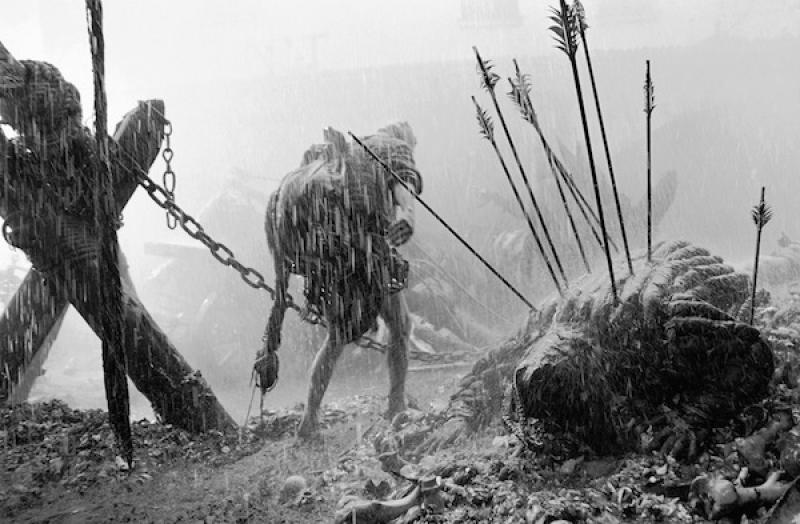DVD: Hard to Be a God | reviews, news & interviews
DVD: Hard to Be a God
DVD: Hard to Be a God
The late Soviet and Russian master Alexei German finds diamonds in the muck

It’s easier to admire than enjoy 2013's Hard to Be a God. The 177-minute final film directed by Leningrad-born Alexei German depicts medieval squalor and butchery so intensely that the viewer is forced to shrink from its portrait of life without culture, humanism, and soap. Like another protracted masterpiece, Béla Tarr’s 2011 The Turin Horse, German’s miasmic swansong imparts its riches mostly after being endured and reflected upon.
Adapted from the novel by Arkady and Boris Strugatsky, whose Roadside Picnic begat Tarkovsky’s Stalker, Hard to Be a God was filmed between 2000 and 2006 and, following German's death in 2013, finished by his wife and co-screenwriter Svetlana Karmalita and their son Aleksei German Jr. It’s set on Arkanar, a planet stuck in its own Dark Ages, which scientists from Earth have pledged not to end artificially. Until there’s a renaissance, all intellectuals, artisans, and artists must seek refuge or perish. Pol Pot’s Cambodia and contemporary Iraq and Syria are evoked, though German was presumably looking back to Stalin's USSR.
One visiting scientist, Don Rumata (Leonid Yarmolnik), has persuaded the Arkanarians he’s a god and roams the land as a noble (and hygienic) knight rescuing the reviled “smart arses”; his search for a royal doctor, Budahk, supplies the movie’s quest. Though there’s a series of vivid rendezvous and bloody encounters, and roving single-take shots give the illusion of a Brueghelian panorama, German’s literally tight focus on Don Rumata and his retinue’s tortuous progress gives the impression of stasis, or even retrogression.
Hard to Be a God is more muted than Khrustalyov, My Car! (1998), German’s hallucinatory vision of the anti-semitic “Doctors’ Plot” to kill Stalin. However, it shares that film’s satirical humour, along with the viscerality and exoticism of Ardak Amirkulov’s seismic Genghis Khan epic The Fall of Otrar (1991), which German co-wrote and produced. The new DVD and Blu-ray extras include Karmalita’s introduction, a career profile of German, and an interview with German Jr.
rating
Explore topics
Share this article
more Film
 Fantastic Machine review - photography's story from one camera to 45 billion
Love it or hate it, the photographic image has ensnared us all
Fantastic Machine review - photography's story from one camera to 45 billion
Love it or hate it, the photographic image has ensnared us all
 If Only I Could Hibernate review - kids in grinding poverty in Ulaanbaatar
Mongolian director Zoljargal Purevdash's compelling debut
If Only I Could Hibernate review - kids in grinding poverty in Ulaanbaatar
Mongolian director Zoljargal Purevdash's compelling debut
 The Book of Clarence review - larky jaunt through biblical epic territory
LaKeith Stanfield is impressively watchable as the Messiah's near-neighbour
The Book of Clarence review - larky jaunt through biblical epic territory
LaKeith Stanfield is impressively watchable as the Messiah's near-neighbour
 Blu-ray/DVD: Priscilla
The disc extras smartly contextualise Sofia Coppola's eighth feature
Blu-ray/DVD: Priscilla
The disc extras smartly contextualise Sofia Coppola's eighth feature
 Back to Black review - rock biopic with a loving but soft touch
Marisa Abela evokes the genius of Amy Winehouse, with a few warts minimised
Back to Black review - rock biopic with a loving but soft touch
Marisa Abela evokes the genius of Amy Winehouse, with a few warts minimised
 Civil War review - God help America
A horrifying State of the Union address from Alex Garland
Civil War review - God help America
A horrifying State of the Union address from Alex Garland
 The Teachers' Lounge - teacher-pupil relationships under the microscope
Thoughtful, painful meditation on status, crime, and power
The Teachers' Lounge - teacher-pupil relationships under the microscope
Thoughtful, painful meditation on status, crime, and power
 Blu-ray: Happy End (Šťastný konec)
Technically brilliant black comedy hasn't aged well
Blu-ray: Happy End (Šťastný konec)
Technically brilliant black comedy hasn't aged well
 Evil Does Not Exist review - Ryusuke Hamaguchi's nuanced follow-up to 'Drive My Car'
A parable about the perils of eco-tourism with a violent twist
Evil Does Not Exist review - Ryusuke Hamaguchi's nuanced follow-up to 'Drive My Car'
A parable about the perils of eco-tourism with a violent twist
 Io Capitano review - gripping odyssey from Senegal to Italy
Matteo Garrone's Oscar-nominated drama of two teenage boys pursuing their dream
Io Capitano review - gripping odyssey from Senegal to Italy
Matteo Garrone's Oscar-nominated drama of two teenage boys pursuing their dream
 The Trouble with Jessica review - the London housing market wreaks havoc on a group of friends
Matt Winn directs a glossy cast in a black comedy that verges on farce
The Trouble with Jessica review - the London housing market wreaks havoc on a group of friends
Matt Winn directs a glossy cast in a black comedy that verges on farce
 Silver Haze review - daughters of Albion dealing with damage
Vicky Knight and Esmé Creed-Miles shine in a drama inspired by Knight's tragic past
Silver Haze review - daughters of Albion dealing with damage
Vicky Knight and Esmé Creed-Miles shine in a drama inspired by Knight's tragic past

Add comment